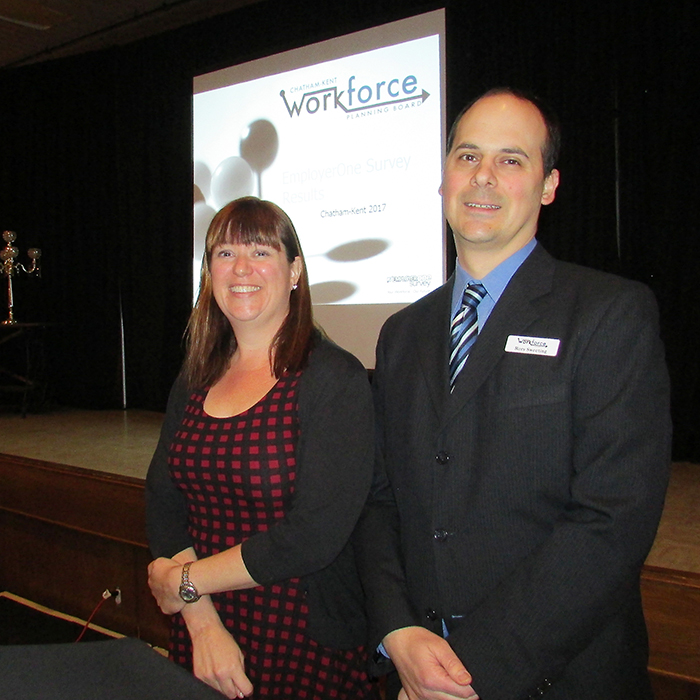
The municipality’s Workforce Planning Board (WPB) believes if more local businesses and industry took part in its annual EmployerOne survey, it would benefit the entire community.
The board, led by Rory Sweeting and Kristy Jacobs, released the results of the third annual survey at a March 30 breakfast. Municipal employees, non-profit personnel, business owners and managers, provincial officials and local MPP Dave Van Kesteren attended.
>
Jacobs said the goal of the survey is to build a more successful Chatham-Kent, by understanding what employers have at their disposal, but more importantly, discovering what they need.
Mayor Randy Hope, the president of the WPB, concurred.
“We need to identify issues we are facing in Chatham-Kent, and help ensure we have the workforce to meet the needs of employers of tomorrow,” he said. “This survey aids in the understanding of the issues employers are facing.”
Jacobs said pulling data from Chatham-Kent from Statistics Canada, as it is not an isolated Census-monitored area, but is instead lumped into regional numbers, is very difficult. As a result, getting information right from employers is important.
Unfortunately, after three years, only six per cent of local businesses responded – 198 out of 3,640 local businesses that have multiple employees.
Jacobs said this year’s goal was actually 200 responses, as there were 142 last year and 73 in 2015.
Of the 196 respondents, she said 162 were established businesses, seven were startups, and 29 were in their growth phase.
Jacobs said the survey provided excellent detail into what’s transpiring at these businesses, but also led to questions.
For example, only 11 per cent of the workforce of these businesses is under the age of 25. Of the remainder, two thirds are between 25 and 54, with the other 22 per cent being over 55.
“More drill down is needed as it’s unclear why the younger numbers are so low,” Jacobs said. “Are they still in school? Are there no job opportunities?”
Seventy per cent of respondents let staff go last year – either from firing, lay off or staff quitting – while 78 per cent said they hired. As well, the number of hirings – 1,842 – exceeded the number of separations – 1,640.
Jacobs said the economy is on the upswing, according to the survey, as 63 per cent of respondents indicated they planned on hiring over the next 12 months, with the primary reason being expansion.
“Slow and steady growth. That’s phenomenal,” she said.
Hope agreed.
“There are employers who want to hire and bring jobs to Chatham-Kent,” he said. “Let’s not let them down.”
Jacobs said the businesses that hired last year mostly focused locally to advertise the positions. She would like to see businesses look for employees outside Chatham-Kent.
“If you are only looking in Chatham-Kent, you may not find the folks you are looking for,” she said, adding 37 per cent of the organizations that hired in 2016 had a hard time filling their vacant positions.
The top reasons for the difficulties include a lack of applicants, lack of qualifications among the applicants and a lack of work experience, she said.
Further, Jacobs said the survey indicates there is a dearth of qualified people for positions here, as respondents indicated there were more poorly qualified people (20 per cent) than excellently qualified personnel (five per cent). The respondents said 25 per cent of the workforce is good and 50 per cent is fair.
In terms of in-demand job skills, Jacobs said she is seeing a consistent trend for local businesses – soft skills – ones not necessarily taught, but rather learned.
Those include communication, customer service, teamwork, self-motivation and work ethic.
“The mindset is, ‘Give me someone who will show up and I will teach them how to work the computer,’” Jacobs said. “Those five have not changed.”
Hope said the soft skills are something that needs to be emphasized to today’s youth, possibly through schooling. He added people now seem more focused on the smartphone or tablet in their hands than the people around them.
“Sometimes we forget about communication skills – being able to talk,” he said.
As for skills taught in school, Jacobs said the people of Chatham-Kent have a low level of educational attainment.
“We need to make those education levels meet the needs of employers,” the medieval studies graduate said






